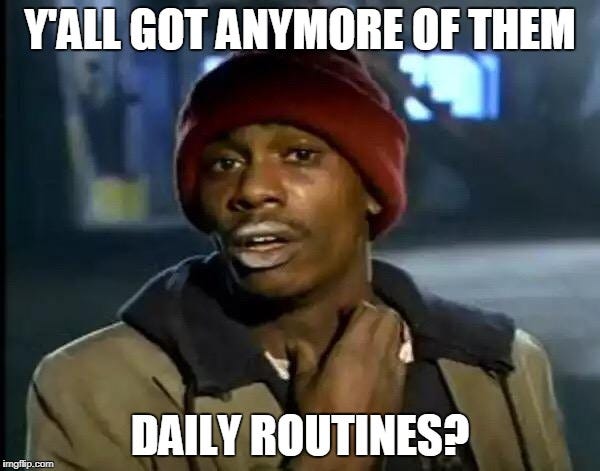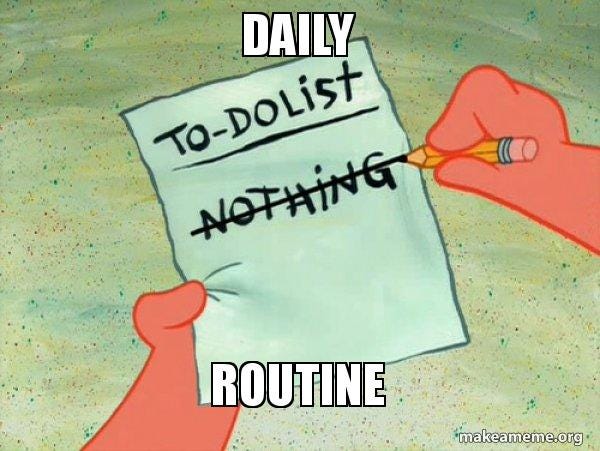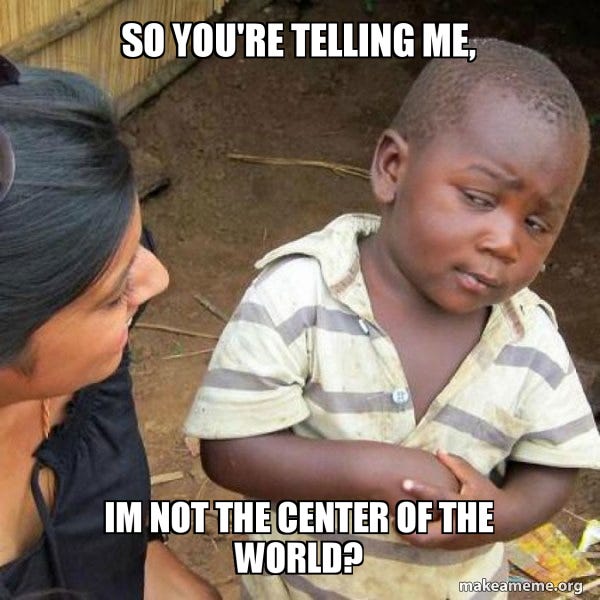always optimizing, never arriving
we track. we optimize. we obsess. and it’s never enough.
I’m Tuğba, a Greek-Turkish artist living in Berlin. as slow as possible is a newsletter exploring the in-between spaces of our lives—the ones we see but often overlook. Interested in reading more of my work?
Morning routine. Evening routine. Sleep routine. Gym routine. Writing routine. Art routine. Nutrition routine. Self-care routine. Work routine. Reading routine. Weekend routine…
Routines on top of routines.
Everywhere you look, there’s advice on how to optimise every part of your life.
Productivity gurus, biohackers, influencers, self-help books, newsletters, YouTube videos, apps. Constant noise. Constant pressure to be the “best version” of yourself.
It’s always the same promise: happiness, if only you keep improving.
But it sets a standard that’s impossible to reach.
And it’s always about me, me, me.
Me at the centre of the world.
Yet, with all this advice at my fingertips, I often feel like I’m falling behind.
There’s never enough time for all the routines. That nagging feeling of never enough persists. And if you’re not constantly improving, you feel like you’re failing.
After the pandemic, I noticed that I had started cutting down time with friends. It had been going on for months before I realised the pattern. Not going to dinners because I “had” to be in bed by 10 pm to hit eight hours so I could wake up early, do the morning routine, and be fit enough for the gym. Not going on dates because I felt I could use the time more productively — reading, working on art, ticking off another goal. Even feeling guilty waking up at 9 am on weekends, when I should’ve been up earlier to squeeze in more reading, more optimising.
But honestly… I feel suffocated.
Suffocated by the endless life hacks.
Suffocated by the pressure to always be more.
Suffocated by not being allowed to just be human, to be flawed.
Suffocated by measuring myself against some impossible standard.
Suffocated because there’s always something more I could be optimising.
Ironically, I actually love my routines. But looking back, I see how I’ve become obsessed with squeezing more out of every second. What made it harder to spot is that most of my friends are doing the same. We swap tips, compare routines, laugh at gym selfies at 7 am, joke about how we’re “getting old”, boring, and loving our routines.
And of course, technology amplifies it all. Trackers, apps, data everywhere. A few years ago, I used a Whoop. Thought it’d be fun. Instead, it turned into a numbers obsession. I’d stress over sleep metrics, recovery scores, how “ready” I was. I stopped socialising altogether because it interfered with my perfect stats.
The past two weeks, I’ve been on holiday, far away from my regular routine.
And it hit me — I struggle to relax. Even on holiday, I caught myself trying to fill every moment productively. Still haunted by the routines I wasn’t keeping up with. That itch of feeling behind. And I started wondering — how many of us are trapped in this loop?
The self-improvement industry is booming. It’s worth over $50 billion in 2024 and is expected to hit $86 billion by 20341. A whole market built on reminding us we’re never quite enough. But always with that tantalising promise that could be, if we optimise more.
Recently, I came across Michel Foucault’s work. He talked about self-surveillance decades ago. Foucault argued that modern societies no longer need to control people through direct force (guards, punishment, public executions). Instead, control happens internally. People start to monitor and regulate their own behaviour, thoughts, and bodies because they’ve internalised societal expectations and norms.
He used the idea of the Panopticon, a prison design by Jeremy Bentham. In a Panopticon, prisoners are arranged in a circle, and there’s a central watchtower. The trick is, prisoners can’t tell if they’re being watched at any given moment — so they behave as if they’re always being watched. Eventually, the constant possibility of surveillance becomes so internalised that they control themselves.
In today’s world, self-surveillance plays out through:
Fitness trackers, sleep trackers, productivity apps
Constant goal-setting and optimisation
Comparing yourself with others on social media
Internalising advice from influencers, books, and experts — always trying to improve
No one needs to tell you to be "better" all the time because you’ve absorbed it. You’re doing it to yourself. Foucault points out that while this looks like “freedom” (you’re choosing to improve), it’s actually another form of subtle control.
In Foucault’s terms: you enforce the societal norms on yourself.
You’re both the prisoner and the guard.
And when every day becomes a project to tweak and maximise, exhaustion and burnout are just around the corner.
There’s no space left for anything spontaneous.
No breathing room.
Just endless self-discipline.
Even creativity, which is meant to be about play, starts feeling like another task on the to-do list. Something else to optimise. And that’s the exact opposite of how creativity works. My best ideas have always come when I wasn’t forcing them, when I was messing around, wasting time.
Unstructured time isn’t wasted time. That’s when real life happens.
So the past week, I’ve been trying something different:
Letting myself scroll on Instagram more than usual.
Eating dinner without grabbing a book straight away.
Sleeping in.
Letting myself “waste” time and sit in the discomfort.
And yeah, it’s uncomfortable. But I’m realising that this is the balance I’ve been missing. I don’t want life to feel like a checklist. I don’t want every day to feel like a project to fix.
Over-optimisation treats life like a puzzle to crack rather than a beautiful mess to live.
And no, we don’t need to streamline every part of our lives with technology just because capitalist-driven companies keep telling us to. It’s okay to leave space. To let things be imperfect. To just be.
If you enjoy my work, the best way to support it is by restacking 🔄 It’s quick, effortless, and helps my words reach more hearts and minds. Thanks for being part of this journey—I’m grateful for you 🖤
Take care!
Your friend Tuğba
Personal Development Market Size, Share, and Trends 2025 to 2034






I think it’s a way of postponing our feelings of not being enough or avoiding the struggle of living with uncertainty. We fear total freedom—the sheer vastness of existence—because without norms and labels, it’s like staring into the infinite, overwhelmed by possibilities yet feeling paralyzed. This post really resonated with me; I’ve been thinking about how these structures act as handrails for existence, giving us just enough certainty to feel okay while also reminding us of the only true certainty: that life is finite. I really appreciate how deeply you explore this topic. ❤️
Loved this post, Tugba. We need to stop maximizing and learn to settle for 'good enough'. My whole outlook on this issue was changed by the writer Jenny Odell. In her brilliant book "Saving Time", she writes that for anyone obsessed with optimizing/maximizing, it could be healthy to learn to accept mediocrity in certain areas of life and decision-making – and to explore why and to whom it might be/look/feel mediocre. That view can dismantle perspectives of privilege as well.